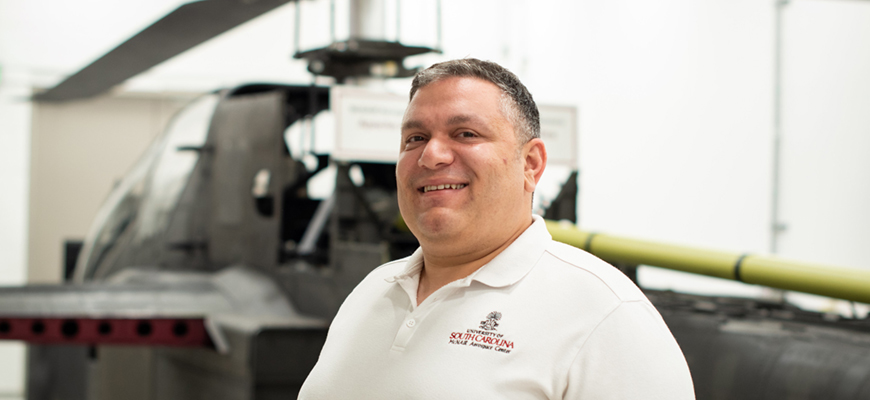
Harik named leading innovator in smart manufacturing
UofSC associate professor’s work highlights university, state as leaders in field
Posted on: June 1, 2020; Updated on: June 1, 2020
By Abe Danaher, adanaher@mailbox.sc.edu, 803-777-5855
It’s been a long journey for Ramy Harik, a Fulbright Scholar who comes from a humble background in Lebanon. Now, the associate professor of mechanical engineering has been recognized as one of the 20 most influential professors in the field of smart manufacturing.
The distinction, announced May 13 by the nonprofit manufacturing organization SME, highlights Harik’s strides in establishing the University of South Carolina — and, by extension, the state — as a leader in the field.
Harik works in advanced composites and industries of the future at the UofSC College of Engineering and Computing. He is a leader within the Society for the Advancement of Material and Process Engineering and will co-chair CAMX – the US’s largest composites conference – in September.
“Ramy is building on the impressive base of manufacturing that has appeared in South Carolina over the past couple of decades,” says Hossein Haj-Hariri, dean of the College of Engineering and Computing. “He is elevating the state to a position of leadership in smart manufacturing, which Gov. McMaster has often referred to, saying that we want to be the smart manufacturing state. Ramy is leading that charge.”
SME’s recognition specifically highlights Harik’s Future Factories laboratory, which focuses on enabling the sharing and analysis of data between different robots and companies amid different stages of manufacturing.
“The whole world wants robots to work together with drones, they want data to come and flow from different equipment, they want to be able to interpret data, they want to be able to make sense of the data. Nobody knows how to do it at large industrial scale so that they are meaningful,” Harik says. “What we are trying to do in our Future Factories is dig deep into the convergence of multiple aspects of the research fundamentally needed to understand how to do this and enable future manufacturing.”
Harik’s work has led to funded partnerships with manufacturing leaders, including NASA, Siemens, Boeing, Toray and Nephron Pharmaceuticals. It has also led to many of his students receiving internships and job offers from these industry leaders.
Lou Kennedy, owner of Nephron Pharmaceuticals, has hired two of Harik’s students in the past six months.
“He’s interested in all the things that we do here, all the processes, and he wants to send us students to be hired. So, I call it the perfect private-public school partnership,” Kennedy says.
Dawn Jegley, a senior aerospace engineer at the NASA Langley Research Center, has had the same success working with Harik and his students.
“If we’ve only got a student here for 10 weeks and we have to spend the first three weeks bringing them up to speed, that limits our ability to make good use of them,” Jegley says. “But when they come from the McNair Center and they have been working with Ramy, then they can hit the ground running.”
In the next five years, Harik plans to grow his Future Factories platform to promote learning across all age groups. He has seven initiatives that will introduce robotics to middle schoolers, create a new undergraduate industrial manufacturing systems-based program at South Carolina, and allow retired people to share their knowledge with future generations.
“It’s no surprise that Ramy earned this recognition from SME,” UofSC President Bob Caslen says. “His Future Factories platform at UofSC continues to redefine manufacturing and encourages collaboration among industry leaders, researchers and students. Ramy is leading South Carolina toward new and innovative possibilities in manufacturing that will transform our state, nation and world for years to come.”
This recognition from SME is especially meaningful to Harik, who grew up in Lebanon and attended the country’s only state-funded university, Lebanese University.
“Receiving this recognition means a lot coming from where I came from,” Harik says. “I am someone who, from 1985 to 1993, did not have a home. For some people, this can create a negative drive. For me, it created my drive. This is why I work so, so hard, because that is something that I never want anyone who depends on me to have.”
Learn more
Mentorship and student success are key focuses for Ramy Harik. The associate professor of mechanical engineering aims to inspire and set his students up for career achievement, such as Brian Youngblood’s work with Tesla and Jackson Swiney’s experience at NASA.